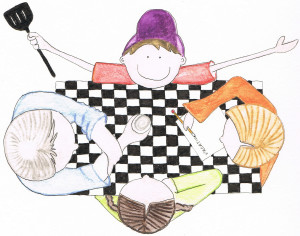
It’s Sunday. Sunny and mild March foothills weather. Sunday is traditionally family day at our house. Today we are all here but doing our own thing. Mu husband is fixing a squeak on his mountain bike (specifically, rear-disc brakes, he just informed me.) My son is building his Lego MindStorms ping pong catapult for Science class. Before I sat down to write this post I was folding laundry (okay, I’m an admitted multi-tasker and was also listening to a blogging podcast on my iPod.) We’re all doing good. But I feel separate. What I really want is connection. Time for a family meeting.
My friend told me she only thinks to hold a family meeting when they are having some kind of crisis. Family meeting = Big Family Issue. So she kinda sorta dreads them.
Instead of equating a family meeting with doom-and-gloom we’re-all-in-trouble issues, what about creating a tradition of connection and enjoyment, a net for the times when things do get rough? I have found that the biggest benefits of family meetings take place over time: a greater sense of well-being, significance, and belonging for all involved. We all want to know our voice matters. What better place than in the safe and loving nest of home?
The following are the steps for your first few family meetings. (These are inspired by Jane Nelson’s take on family meetings from her book, Positive Discipline.) I recommend meeting weekly, and even more often at first to establish a routine and circle of trust.
1) Sit at a Cleared Table. Less distractions =easier to focus.
2) Pick a Leader to run the meeting. Young or old, this position rotates with each family meeting. Younger children may need the help of an adult, but they get to be a leader at some point.
 3) Choose a Talking Stick: We use a wooden spoon or egg beater but also have been known to use such items as a cork, pineapple corer, or garlic rocker. Leader’s choice. The item gets passed and whoever holds it gets to talk.
3) Choose a Talking Stick: We use a wooden spoon or egg beater but also have been known to use such items as a cork, pineapple corer, or garlic rocker. Leader’s choice. The item gets passed and whoever holds it gets to talk.
4) Start with “Gratefuls:” we alternate between sharing what we’re thankful for or giving compliments.
5) Plan for Family Fun: Discuss the next family event or outing. Use a whiteboard to list all ideas with words or pictures. Take a vote and circle the one that’s coming up. Younger family members can check in with the board later and build e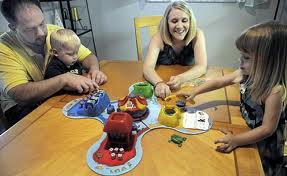 xcitement for the upcoming activity.
xcitement for the upcoming activity.
6) End with playing a family game or a fun dessert. Or both. (I’m not advocating excessive sugar here, especially with my husband on day 378 of NO sugar – check out Super Healthy Kids for some great ideas on healthy desserts.)
Benefits
- Needs can be addressed
- Builds trust
- Each voice matters
- Forum for difficulties
- Teaching opportunity
- Well-being, significance, and belonging
Family Values
A Family Meeting is a great place to discuss and clarify your family’s values. Brainstorm with everyone, accepting all ideas. Discuss and come up with five or six that you can post near your meeting place. Words work with older children (and also act as great parent reminders) – the addition of pictures or photos are helpful for younger children.
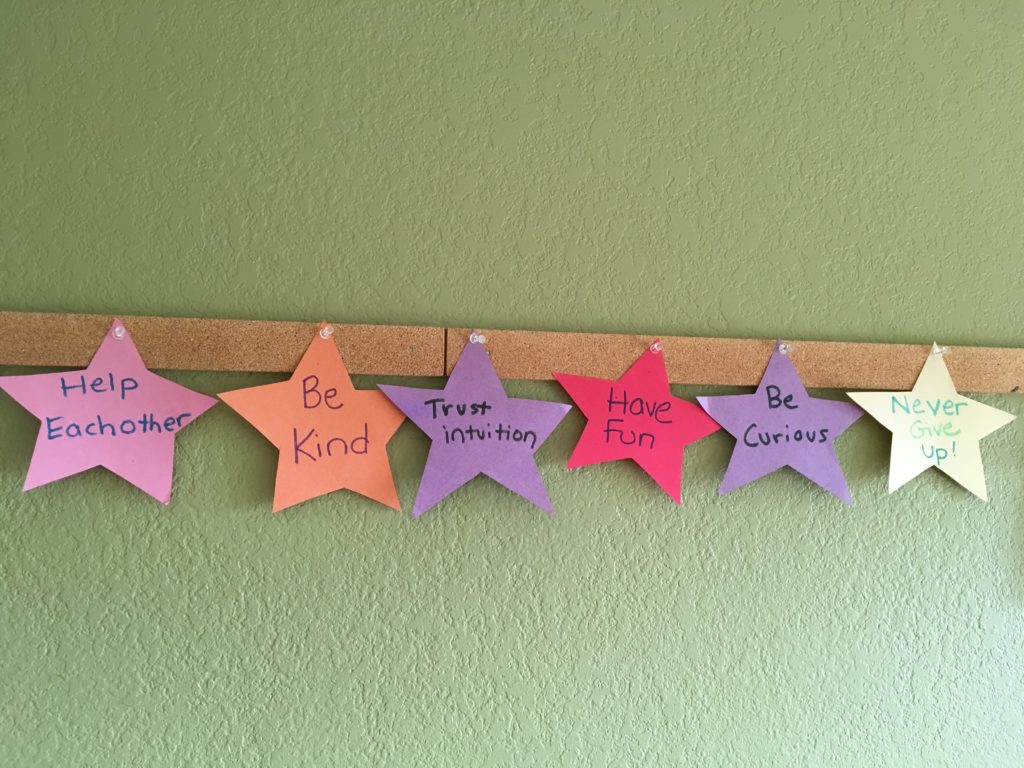
When giving Credit Reports of positivity to family members, it’s helpful to add a family value. For instance:
“You took the dishes off the table. That helps the whole family.”
“Instead of yelling, you Closed the Distance to ask your sister for her book. That helps our house be peaceful.”
Central Location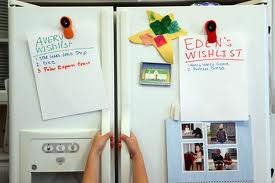
One family communication idea is to have a central place where family members can write down (or draw a picture) of what is up for them (like a wipe board on the fridge.) The topics might range from something fun like family vacation ideas to a more difficult topic like sibling bickering.
Family Contributions
A Family Meeting is a great place to discuss chores or family contributions. Address this hot topic at least once a month. Are agreements being kept? Does a new arrangement need to be made? What successes have occurred?
Problem-Solving
When there is an issue on the table, first find out each person’s 100% need or desire around the issue. Use family brainstorming to problem solve. Develop a plan of action and get agreement from all family members. Revisit the issue at the next family meeting to check-in on how things are going.
Example
Issue: Rude tone or mean words spoken to other family members.
First round: Clarify the Issue. What specific words and what kind of tone are most disrespectful?
Second round: The Effect on Family Members. Each person says how this is for them to either be a speaker or receiver of disrespect. Perhaps this has become a habit, a way to show anger, hurtful to receive, or some family members may not even be aware it was an issue.
Third round: Problem Solve. Discuss the family rule or expectation around the behavior.
- If someone is angry, other family members will try to hear them out. “You seem really mad about…”
- A list of ideas: Someone might recommend checking out the brainstormed list of family ideas for what to do when angry instead of to take it out on others (generated then or at another family meeting – for example, if angry, take some time alone, scream on the porch, jump on the trampoline, etc. These could be kept on a white board and updated with new ideas.)
- When hearing mean or angry words directed at someone, a family member has permission to call it out. “Those words feel mean.” “I don’t want to be around you when you call me names.” “It’s hard to hear what you’re asking for when you yell at me.”
- Is there an okay place to say some disrespectful words – especially young children who want to experiment with “bad words”? The bathroom? The back yard? The garage?
- Practice speaking with respect. If children are young, use puppets/dolls with playtime to role play a scenario, or tell a customized bedtime story where an animal friend works through this same issue. If children are older, use a quiet moment to do a Think-a-Minute around the family value of respectful words
In Your Home
Do you have a family meeting idea to share? Do you do them? Do they happen as needed? Or on a regular basis? One friend says she loves the idea, but she just never thinks of it. Another friend has admitted she has issues with repetition and structure and this just doesn’t feel like a fit for her. What about you?
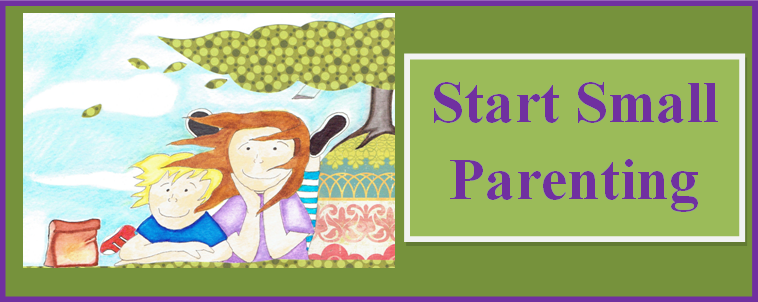

It’d be fun to have a casual family meeting have a theme… game meeting, trip meeting, food meeting…
Oh, I like the theme ideas!
We try to have a weekly family meeting, usually on Sunday nights, that looks ahead to the coming week. What are everyone’s plans, goals or wishes? What happened last week that we don’t want to repeat? What needs to be changed or addressed? We avoid blaming or ganging up on one person who might have said or done something wrong, and we focus on the positive – a future family trip or plans for spring break. We have two teenagers in our house, so it’s crucial to keep the meetings light & upbeat, otherwise they can turn into heated arguments that nobody wins. We’ve been doing this since both kids were old enough to voice their own opinions, and I’m amazed that most families don’t have a weekly meeting. It doesn’t solve every problem, but it gets us talking to each other, not at each other.
Great to hear you are doing that, ‘Dad’. Sounds like a winning formula.
We’ve had family meetings for years. Our “talking stick” is always the same-it’s a carved man-tall stick with a leather wrapped beaded section with a chicken-bone and deer antler attached at the top. On the bottom there’s a knothole covered in red paint-the kids and hubbie know it reminds me of blood, so they always hand me the stick with that end towards me. No one speaks unless s/he is holding the talking stick. We sit on couches in the living room. They were often weekly, but in general were called by whoever wanted one. We also hold weekly “planner” meetings. This started when we had two kids in high school (they’re now 20 and 22). We held the planner meetings to figure out who needed to be where when-and it was easily the best thing we did to promote win-win living in our family. Now we only have one child at home, a 9th grader, and the planner meeting is not only our scheduling mechanism, it’s our vehicle to teach the skill of being proactive.
Your family literally “waves a chicken bone.” How fun! I think many parents know about family meetings or have done some version- BUT reminders that they WORK are great, especially from seasoned parents like yourself. And YES to the planning meetings – those logistics can cause stress if not managed! Thanks so much for sharing, Heather.